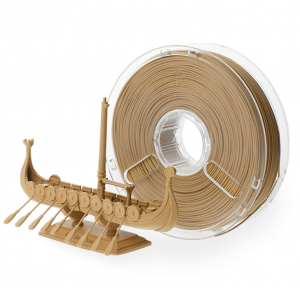As the 3D printing arena moves from hype to the edification of a substantial industry, the wheat will be separated from the chaff via genuine innovation, solid business strategy, and conscious marketing. Without a combination of all of these things, and other factors, 3D printing businesses may not be in it for the long haul. At the same time, more mainstream businesses are looking to take over a market previously dominated by start-ups and companies with smaller market caps. One start-up that may be primed to survive this next stage of 3D printing development is Polymaker, a start-up that hit Kickstarter just one year ago with their own line of 3D printing filaments.

After successfully launching their Kickstarter with their PolyMax™ PLA, PolyFlex™ and PolyWood™ filaments, Polymaker has been developing their product line and getting it out to the public. For instance, the start-up has since developed their LT80, with a low melting temperature of 80° C, specifically for Bonsai Labs’ kid-friendly BS Toy 3D printer. In order to shift from a start-up to an important player in the industry, Polymaker has rebranded itself with a new website, logo, and even name. And, after closing a $3 million Round-A funding led Legend Star, VC subsidiary of Lenovo owner Legend Holdings, Polymaker is ready to tackle the world of 3D printing.
 Of the funding round, Aaron Jennings, Design and Communications Manager at Polymaker, tells me, “This investment was done on behalf of Lenovo the global computer company responsible for the wide known and used Thinkpad laptops. Lenovo discussed with Legend Star that they were looking to invest into growing markets, such as the 3D printing industry. After some research, both Lenovo and Legend Star saw Polymaker as a growing and influential company within the industry that offers truly innovative materials to 3D printing enthusiasts.” As a result, the VC subsidiary was joined by two other Chinese VC firms, ShareLink Capital and Zhilang Investment Management (Suzhou) Co. Ltd., providing Polymaker with the $3 million necessary to become a global player by developing new products, increasing manufacturing, and extend their global distribution networks.
Of the funding round, Aaron Jennings, Design and Communications Manager at Polymaker, tells me, “This investment was done on behalf of Lenovo the global computer company responsible for the wide known and used Thinkpad laptops. Lenovo discussed with Legend Star that they were looking to invest into growing markets, such as the 3D printing industry. After some research, both Lenovo and Legend Star saw Polymaker as a growing and influential company within the industry that offers truly innovative materials to 3D printing enthusiasts.” As a result, the VC subsidiary was joined by two other Chinese VC firms, ShareLink Capital and Zhilang Investment Management (Suzhou) Co. Ltd., providing Polymaker with the $3 million necessary to become a global player by developing new products, increasing manufacturing, and extend their global distribution networks.
Dr. Xiaofan Luo, co-founder and CEO of Polymaker, says, “Our core mission is to make 3D printing more useful and accessible for everyone. This investment came just in time for us to further realise that mission.” Gang Lu, Vice President and Managing Director of Legend Star, adds, “We are very excited to partner with Polymaker. Legend Star is very interested in 3D printing. We believe Polymaker, with its unique technologies and a strong culture in innovation, has the potential to really bring personal 3D printing to the next new level.”
Re-emerging as a global industry player, the company has redesigned its website and brand altogether. Jennings continues, “Polymaker has gone through a rebranding company to really start to establish the company’s name and branding with the industry. We had our internal design team working over the past few months redesigning our website along with our new branding.” The name itself was changed from Polymakr to Polymaker, with Jennings saying in a press release, “We felt that the new name will provide constancy and ease of use, thus adding a certain timelessness to our branding.” Additionally, the logo has been made to be clean and minimal, while still playful.

And, though they’ve already doubled their filament line, the company plans to release more products this year that will “greatly change the way people 3D print and how 3D printing can be used,” according to a press release. Lenovo has already made a deal with Taiwan’s XYZprinting to sell the da Vinci Jr. through their consumer retail wing FM365. And, with Lenovo computers featuring the Intel RealSense 3D camera, the electronics manufacturer might be primed to play an important role in the future reality computing industry, with Polymaker right there at their side.


Leave A Comment